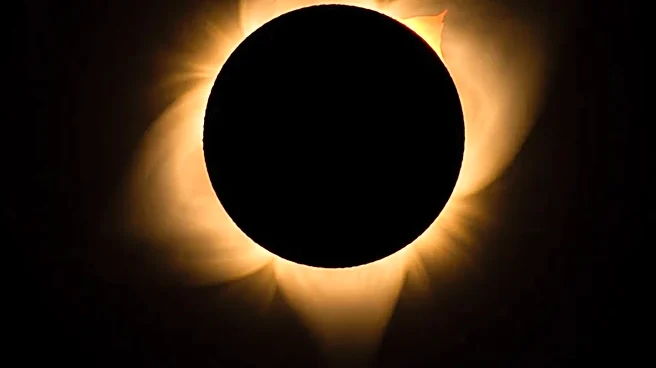What's Happening?
Astro tourism companies are preparing for the 2027 total solar eclipse, which is expected to be the longest of the 21st century. The eclipse will occur on August 2, 2027, and will be visible across North Africa and parts of Europe. The event is notable for its extended duration of totality, lasting over six minutes due to a rare cosmic alignment where the Earth is at aphelion and the Moon at perigee. This alignment allows the Moon to completely block the Sun for an extended period. Tours are being organized to view the eclipse from optimal locations, such as Egypt and Libya, where clear skies are anticipated. These tours often include additional cultural and historical activities, and are led by expert astronomers.
Why It's Important?
The 2027 solar eclipse presents a unique opportunity for astro tourism, attracting enthusiasts and travelers from around the world. The extended duration of totality makes it a rare event, increasing demand for travel packages to view the eclipse. This surge in interest can boost local economies in regions where the eclipse will be visible, particularly in North Africa. Additionally, the event highlights the growing trend of astro tourism, where travelers seek experiences centered around astronomical phenomena. This trend can lead to increased investment in tourism infrastructure and services in these regions.
What's Next?
As the date of the eclipse approaches, tour operators are likely to see increased bookings, with many packages already filling up. Travelers interested in witnessing the eclipse are advised to book early due to limited availability. Local governments and tourism boards may also ramp up promotional efforts to attract visitors, potentially leading to collaborations with international travel agencies. The event could also spark interest in future astronomical events, encouraging more people to engage in astro tourism.
Beyond the Headlines
The 2027 solar eclipse could have broader implications for scientific research and public interest in astronomy. It provides an opportunity for scientists to study the Sun's corona and other celestial phenomena during totality. Additionally, the event may inspire educational initiatives aimed at increasing public understanding of astronomy and celestial mechanics. The cultural and historical elements included in many tour packages also offer a chance to highlight the rich heritage of the regions hosting the eclipse.









